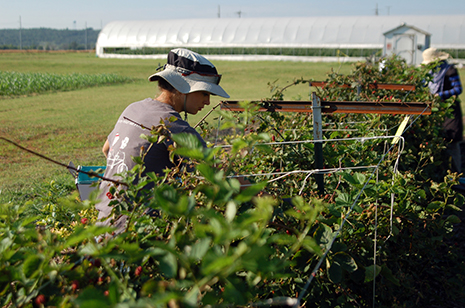FAYETTEVILLE, Ark. – Kat Ginsburg, a senior majoring in horticulture in the Dale Bumpers College of Agricultural, Food and Life Sciences at the University of Arkansas, recently completed an apprenticeship in the Southern-Sustainable Agriculture Research and Education Young Scholars Enhancement Grant Program.
Ginsburg, who is from Hot Springs, was one of only six students from the southern region selected to participate in the program, which offers grants to encourage research and education projects by freshmen and sophomores pursuing degrees emphasizing sustainable agriculture. The southern region includes Alabama, Arkansas, Florida, Georgia, Kentucky, Louisiana, Mississippi, North Carolina, Oklahoma, South Carolina, Tennessee, Texas, Virginia, Puerto Rico and the U.S. Virgin Islands.
Ginsburg’s project, “Extending the Market Season with High Tunnel Technology for Organic Fruit Production,” was a managed experiment on the effects of shade on primocane blackberry growth, flowering and yield in field conditions. Shade was used as a management tool to delay flowering and to improve fruit quality in a high temperature and high solar radiation environment.
Ginsburg worked with professor Curt Rom, and research specialists Luke Freeman, Jason McAfee and Heather Friedrich on the research. Her objective was to manage primocane blackberries and raspberries for extended autumn production, and floricane blackberries and blueberries for extended spring production, using high tunnel and field production systems.
Primocane refers to new cane on a bramble fruit that will flower the following year, and floricane refers to a plant stem that flowers and bears fruit in its second year. The primocane blackberries and raspberries were developed by the University of Arkansas System Division of Agriculture.
Blueberries and blackberries have a limited harvest and market season during the summer in a field production system, and raspberries are not well-adapted to the south. High tunnels (shading) advanced spring production and extended the autumn harvest season four to six weeks.
“High tunnels are a potential sustainable means of extending the cropping season and protecting crops from environmental damage and pests,” said Ginsburg. “High tunnels are a compliment to field production systems and contribute to economic sustainability. A problem of excessive heat and solar radiation limits primocane blackberry production in the southern region, and shade may provide opportunities for introducing and expanding the crop in this region.
“The extended season generated more harvests, produced higher marketable yields, increased fruit quality and reduced crop loss to weather,” she said.
The SARE grant was for more than $200,000. Grants provide for an experiential learning component that emphasizes research and extension, and place students in science, technology, engineering, mathematics and social science activities.
“Kat worked in our research program to learn sustainable and organic production techniques, developed and conducted a research project of her own, and worked all summer learning horticulture management skills,” said Rom. “Only a few SARE grants were awarded this year. We feel fortunate to have had Kat participate. It was a great enhanced-learning experience for her and great for our program.”
Topics
Contacts
Curt Rom, horticulture professor
Bumpers College of Agricultural, Food and Life Sci
479-575-4625,
Robby Edwards, director of communications
Bumpers College
479-575-4625,
